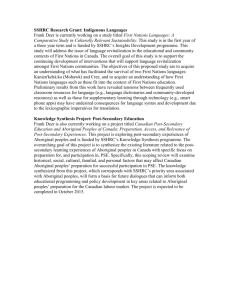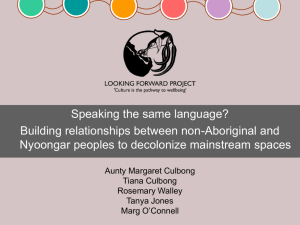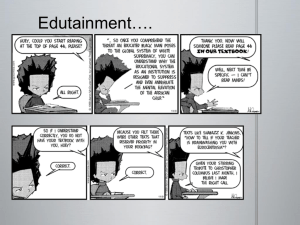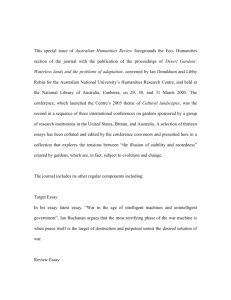Supporting Talent Development, Research and Connections
advertisement
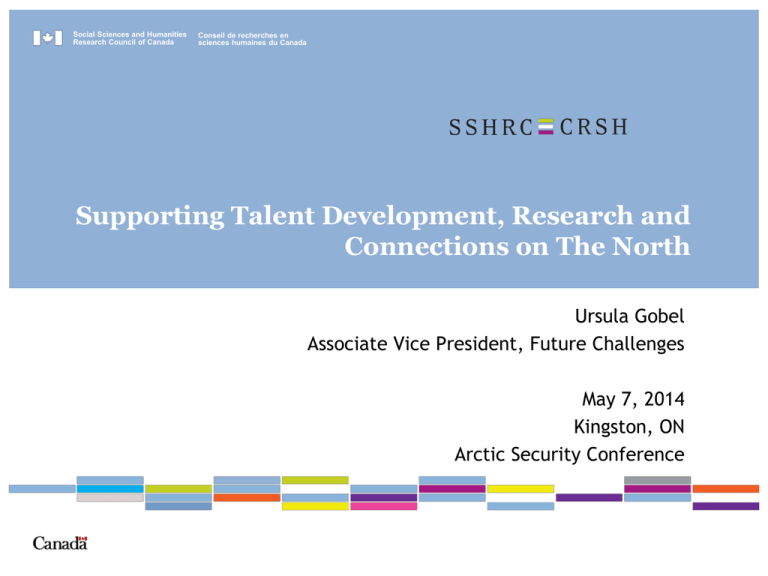
Social Sciences and Humanities Research Council of Canada Conseil de recherches en sciences humaines du Canada Supporting Talent Development, Research and Connections on The North Ursula Gobel Associate Vice President, Future Challenges May 7, 2014 Kingston, ON Arctic Security Conference Social sciences and humanities research builds knowledge about people in the past and present, with a view toward creating a better future 2 “As a mining company with operations in remote areas of Northern Saskatchewan, we partner with academia and aboriginal communities in order to create engagement in our decision making and to facilitate participation in our investments.. As such, we applaud the work of SSHRC to support the industry, academic and community partnerships.” Dr. Grant E. Isaac, Chief Financial Officer and Senior Vice-President CAMECO Corporation 3 Through its programs and policies, SSHRC works to develop talented leaders for all sectors of society, help generate insights about people, ideas and behaviour and build connections within and beyond academia that will build a better future for Canada and the world. 4 SSHRC: Helping Build a Better Future for Canada and the World TALENT INSIGHT CONNECTION Supporting students and postdoctoral fellows to develop next generation researchers and leaders across society Supporting excellent research to advance knowledge and build understanding about people, communities and societies Supporting the exchange of knowledge to maximize the intellectual, cultural, social and economic impacts of social sciences and humanities research PARTNERSHIPS - Within the academic community and between academia, industry, government, not-for-profits and communities. 5 SSHRC grants expenditures for 2012-2013 3/23/2016 6 NSERC CIHR SSHRC CFI 21st century approach Tri-agency Programs Administered by SSHRC Canada Research Chairs Program, created in 2000 to make Canada a location of choice for top researchers in all research disciplines $300M/annually Indirect Costs Program in support of institutional capacity to enable research and research-related activities in all research disciplines $332M/annually Canada Excellence Research Chairs Program, created in 2008 to attract and retain the world’s top researchers in government S&T priority areas $43M/annually NEW! - Canada First Research Excellence Fund, announced in Budget 2014; parameters for the implementation of the new Fund are currently in development $1.5 billion in the next decade 3/23/2016 8 Budget 2014 − $7 million per year to support advanced research in the social sciences and humanities − Canada First Research Excellence Fund with $1.5 billion in funding over the next decade to help Canadian post-secondary institutions excel globally in research areas that create long-term economic advantages for Canada. − $10 million over two years, starting in 2014–15, for a pilot initiative to connect the talent, facilities and capabilities of Canada’s colleges and polytechnics with the research needs of local community organizations 3/23/2016 9 The North: Investments in Research and Talent Development Between 2007-08 and 2012-13: $77.2 Million 723 Awards 918 Researchers 384 Fellowships and Scholarships 2016-03-23 10 Investments in training, research, partnership and knowledge mobilization − Noorjehan Johnson, Vanier Scholar, McGill University – − Marianne Douglas, University of Alberta – − determining how broadband-enabled service can best work for isolated and rural First Nations communities, and how it affects politics, economic development and education. Marianne Ignace, Simon Fraser University, in partnership with Yukon College – 3/23/2016 With a Public Outreach Grant brought together parents, student teachers, communities and northern government to meet, exchange knowledge and participate in research to better education in the North, by Northerners. Susan O’Donnell, University of New Brunswick – − leads a Partnership Development Grant entitled: Building economic and social prosperity: connecting a Northern university vision through Dechinta Bush University Fiona Walton, University of P.E.I. – − Her PhD work followed local knowledge about climate change from its sources in Northern communities to international organizations including the Inuit Circumpolar Council. leads a Partnership Grant that addresses the challenges of language loss and revitalization in British Columbia and Yukon Territory. Project includes 24 academic and non-academic partners including: community based First Nations organizations, elders, community language practitioners, community linguists, language learners and educators comprising at least 11 languages. 11 Investments in training, research, partnership and knowledge mobilization CANADA RESEARCH CHAIRS −Michael Byers, CRC in Global Politics and International Law, University of British Columbia - issues of Arctic sovereignty, climate change, the law of the sea, and Canadian foreign and defence policy −Brenda Parlee, CRC in Social Responses to Ecological Change, University of Alberta – Social aspects and effects of resource development in the North, and Aboriginal communities’ roles in resource management decision-making −Ken Coates, CRC in Regional Innovation, University of Saskatchewan – 2016-03-23 innovation-based investment, skills training and entrepreneurship working with Aboriginal and business groups in northern and rural communities 12 Collaboration and Partnership Includes SSHRC’s partners: −Canadian Polar Commission / NSTP Management Committee −ADM Committee on Arctic S&T −Association Canadian Universities for Northern Studies (ACUNS) −Boreas (EUROCORE) −NordForsk (Scandinavian network of research support agencies) −CIHR and NSERC 2016-03-23 13 Tri-Council Support: TCPS 2nd edition (2010) All research involving Aboriginal Peoples must be undertaken in accordance with the 2nd edition of the TriCouncil Policy Statement: Ethical Conduct for Research Involving Humans, Chapter 9: Research Involving the First Nations, Inuit and Métis Peoples of Canada. “…serves as a framework for the ethical conduct of research involving Aboriginal peoples….not intended to override or replace ethical guidance offered by Aboriginal peoples themselves. Its purpose is to ensure, to the extent possible, that research involving Aboriginal peoples is premised on respectful relationships. It also encourages collaboration and engagement between researchers and participants.” [emphasis added] 3/23/2016 14 Aboriginal Research Integrated Strategy − Continue to support research by and with First Nations, Metis and Inuit Peoples - Continue to recognize both traditional and contemporary aboriginal epistemologies and ways of knowing to scholarly endeavours - Ensure appropriate support for talent and recognition for aboriginal students and scholars across all social sciences and humanities disciplines; Creation of the Aboriginal Advisory Circle ….. 3/23/2016 15 Knowledge Synthesis: Labour Markets and Skills Development − Employment Skills in Northern Canada − Demographics of Canada’s Future Workforce − Crowdsourcing Métis Research − Leveraging Mentoring − Integrating International Students − Investing in Human Capital − Transforming Humanities PhD Programs − Recruiting International Workers 3/23/2016 − Integrating International Nurses − Identifying Gaps With Skillshed Analysis − Developing Skills in Science Class − Supply and Demand of Skills − Workplace Inclusion − Digital Literacy at Work − Sustaining the Family Business − Training for the Traditional Craft Trades 16 Our Goal Set out to identify future challenge areas for Canada in an evolving global context and to which the social sciences and humanities research community could contribute its knowledge, talent and expertise. The initiative builds upon SSHRC’s history in supporting research in areas that would enhance Canada’s ability to address future challenging issues: aging, digital technologies, learning and education…. 18 What might the implications of global peak population be for Canada? How can emerging technologies be leveraged to benefit Canadians? Sustainable, Resilient Communities Governance & Institutions What knowledge will Canada need to thrive in an interconnected, evolving global landscape? Values, Cultures, Inclusion & Diversity IMAGINING CANADA’S FUTURE What effects will the quest for energy and natural resources have on our society and our position on the world stage? Canada in a Global Context Creativity, Innovation & Prosperity What new ways of learning, particularly in higher education, will Canadians need to thrive in an evolving society and labour market? How are the experiences and aspirations of Aboriginal Peoples in Canada essential to building a successful shared future? Areas of capacity in social sciences and humanities Northern research: 1. Well-being and social change 2. The co-management of institutions 3. The positive aspects of new empowering relationships 4. Dialogues between differing knowledge systems 5. Including Aboriginal peoples in research 6. New communications technology and cultural revitalization 7. Internationalization of research 3/23/2016 20 Areas in need of greater Northern research capacity : 1. Economic development 2. Research on the provincial norths 3. Difference between regions with historic treaties and those with new comprehensive treaties 3/23/2016 21 Moving Forward − Assessing research capacity in each challenge area − Identifying opportunities for knowledge mobilization − Encouraging research proposals among funding opportunities in Talent, Insight and Connection, including partnerships − Monitoring and Reporting; Identifying trends and emerging issues 3/23/2016 22
